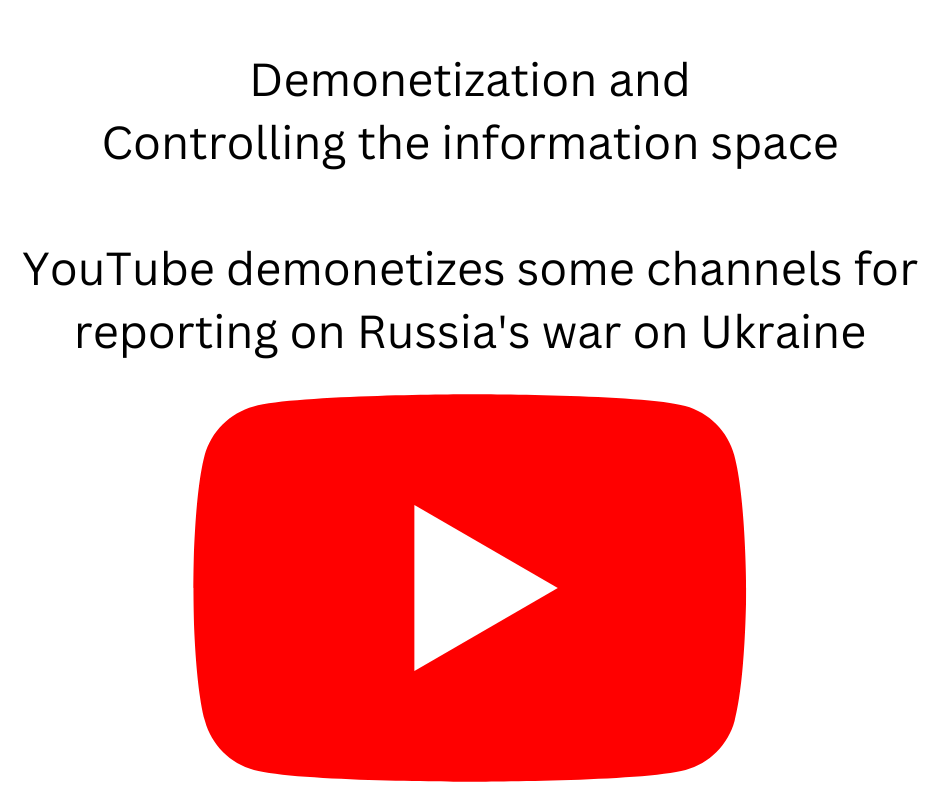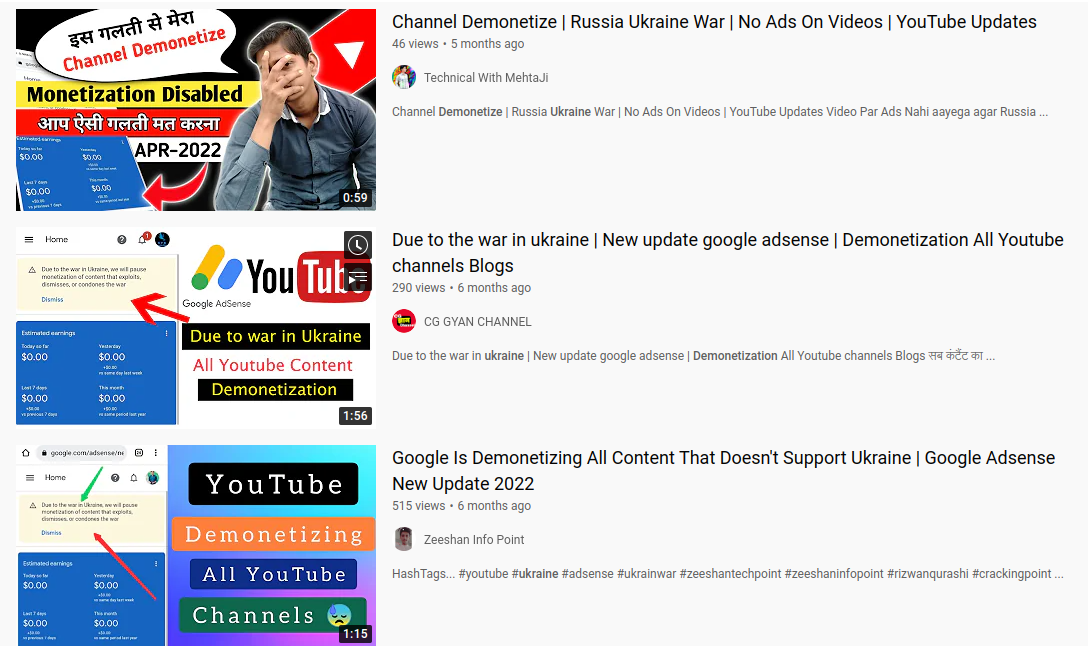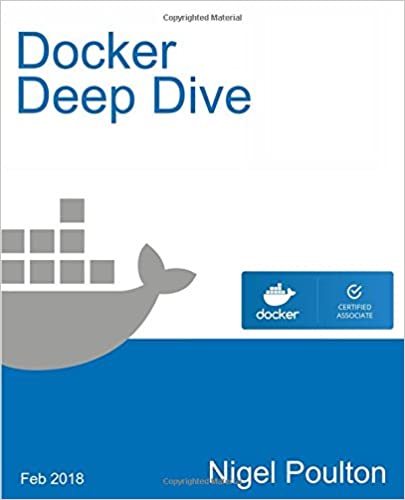; Date: Sat Oct 08 2022
Tags: YouTube Monetization »»»» Ukraine War »»»»
While YouTube is fighting a real problem of misinformation regarding Russia's war on Ukraine, some YouTubers who report on the war have been demonetized.

YouTube holds the power to determine which content creators are paid for their work. A channel that's deemed to violate YouTube policies can be demonetized, cutting off payments to the channel owner. Since creating quality videos takes a lot of effort, channel owners who aren't paid will quickly need to find other work to do. Over the years many channels have been hit with demonetization, some of whom claim YouTube is stifling free speech, or else stifling certain types of information over other types. For example, in 2019 The Hill reported that
right-wing "influencers" complained of being demonetized by YouTube because those liberal tech companies want to stifle conservatives.
It is possible for YouTube to use its power to stifle open political discussion. It's not just YouTube, because it's easy to find folks complaining about censorship by Twitter, Facebook, or the like. The algorithms driving these sites control what we're shown, and in theory these sites could rig things to favor one political view over another.
It's not just right wing commentators that YouTube's actions have affected. Channels all across the spectrum have been demonetized or banned. For example, in July 2020, a YouTube channel specializing in repairing vintage electronics was mysteriously banned. While that channel was reinstated, it's a demonstration that YouTube holds a lot of power over individual channel owners.
Today, October 8, 2022, several YouTubers who report on the Ukraine war say they've suddenly been demonetized. These are people who are creating valuable truthful reporting about Russia's war on Ukraine. Each received e-mail notification including this explanation:
Due to the war in Ukraine, we pause monetization of content that exploits, dismisses, or condones the war. Please note, that we have already been enforcing claims related to the war in Ukraine when they violated existing policies (for instance, the Dangerous or Derogatory content policy prohibits monetizing content that incites violence or denies tragic events). --
source
elalmayadeen.net
This is puzzling since the affected channels have not exploited, dismissed, or condoned Russia's war on Ukraine. After some searching I found that Google posted the same policy statement to its
Advertising Policy help pages in March 2022. Remember that date.
Taking action against disinformation?
Taking this at face value, this seems like a good move. There are plenty of voices who dismiss Ukraine's right to exist, repeat Russian propaganda claims that Ukraine is committing genocide in Russian-held areas, that Russia is defending itself from NATO aggression, and so forth. In other words, YouTube is fighting disinformation by demonetizing channels it believes are spreading harmful lies about Ukraine.
But, where the rubber meets the road, we can look at the several YouTube channel owners who reported today being told their whole channel is now demonetized. In each case, these channel owners are reporting truthfully about Russia's war on Ukraine, they are not exploiting the war, dismissing the war, or condoning Russia's aggression on Ukraine. In other words, they are not violating the policy, yet their channels have been demonetized.
Denys Davydov, the ex-Ukrainian airline pilot reporting on the Ukraine war
Denys Davydov has over 400,000 subscribers, and his videos routinely hit 1 million views. He has been gathering news about the war on Ukraine for several months, and it is important that he is Ukrainian giving him a lot of credibility.
Typically he gathers a list of daily events, then narrates what's happening while browsing a
Ukraine war status map. His reports are engaging, truthful, informative, and very much pro-Ukraine. He is not dismissive of, nor condoning, Russia's war on Ukraine, but quite the opposite.
Is he exploiting the war? He is openly asking for donations of support. He used to work as a pilot for a Ukrainian airline, but lost his job due to the war, and he needs the income to support his family. If that means he is exploiting the war, then YouTube has a strange understanding of the word "exploit".
See:
Denys Davydov | My channel is now demonetized because I cover the war (Maybe)
Artur Rehi, the Estonian reporting on the Ukrainian War
I don't know Artur Rehi as well, but his channel came up when searching for others who'd been demonetized. He seems to specialize in covering military and historical topics. I've watched a couple of his videos and find them to be truthful, well balanced, informative, and friendly. His channel has over 500,000 subscribers, and his Ukraine videos are regularly getting over 500,000 views.
We can note that Estonia was, like Ukraine, ruled by the USSR. It's a truism that Russia's neighbors are the ones raising the strongest warnings about Russia.
His videos are not dismissive of, nor condoning, Russia's war on Ukraine, but quite the opposite.
See:
My channel is now demonetized because I cover the war
Perun, publishes detailed analyses of the Ukraine war
This is another channel I didn't know about, but which came up searching for others who'd been demonetized.
This channel contains hour-long videos jam packed with interesting analysis of military and historical issues. The last several months the channel has focused on the Ukraine-Russia war. The reporing is truthful and informative. It appears to not be dismissive of, nor condoning, Russia's war on Ukraine. The channel has about 250,000 subscribers, and the videos generally get 500,000 or more views.
In this case, he has announced the demonetization issue was resolved, and hopes for the same with the other affected channels.
See:
Perun's post on his community area, and the followup saying the issue was resolved
Vlad Vexler, Russian-born political philosopher who's a University professor in London
Vlad Vexler has two or three channels where he does political analsys and commentary. He is a prominent and professional philosopher focusing on political philosophy, and his thinking is extraordinarily deep. Because he was born in Russia, he has excellent insight into the Russian mindset and politics.
His content is beyond informative, beyond insightful, is created with high integrity, and is highly recommended to understand what is going on. He is in no way exploiting the war, dismissive of it, nor condoning Russia's actions in the war, but quite the opposite.
He wrote a posting on his
community discussion area saying this:
Hello beautiful community. Today @Denys Davydov and @Artur Rehi and others are reporting their entire channels have been demonetised for speaking about the war in Ukraine. I don't run adds on my channels, but I was informed today that an ad account associated with my channel (which I wasn't using right now but planning to use in future for super thanks etc) has been cancelled.
This is unacceptable. We are talking about an extraordinary lack of transparency and accountability in our public square - which is where you are now. All these channel makers need their monetisation back asap. I shall keep you updated - the bridge episode may or may not be delayed. Love. -- Vlad Vexler
He makes a good point, which is why I've quoted his message.
YouTube (and Twitter, Facebook, etc) is owned and operated by corporations. But, these places are operated as if they are the same as the "public square". Just as we should be free to stand on a box downtown and speak our mind, we should be free to do the same on sites like YouTube.
The expectation created by these companies is that their services are a public square where we are encouraged to speak our mind. YouTube et al made what's called a brand promise that their services are a public square where we can all talk with each other, or share videos or writings.
That promise is harmed Every time these sites take action against an honest upstanding content creator who needs the income to feed his/her family.
Reporting from Ukraine, demonetized since September 7
This is a channel created by a Ukrainian, and as the name suggests he focuses on reporting from Ukraine. In
Demonetization of Ukrainian Reporters, he joins Artur and Denys in raising the demonetization issue. He says he's been discussing the issue with YouTube, unsuccessfully, for the last month.
I haven't watched his videos. It's clear from the video titles that he's frequently giving updates about current events in Russia's war on Ukraine, and that he is firmly on the pro-Ukrainian side.
Jake Broe, an American ex-military guy reporting on Ukraine
Jake is an experienced YouTuber who used to focus on finance and investing information. With Russia's war on Ukraine, he launched into using his military background to analyze what's happening. His reporting has been truthful, informative, and he is well regarded. His channel has about 250,000 subscribers and his videos regularly have 500,000 views.
Jake Broe's channel has not been demonetized, but in
Am I in Trouble? Ukraine YouTubers Are Being Demonetized he covered the problem of demonetization, and expressed fear that he might be next.
Demonetization of Ukraine War content is not new
While searching for examples, these YouTube search results came up:

Notice these results are from 5-6 months ago, placing them in April or March 2022. That matches the timing of the policy statement quoted above.
Russia's war on Ukraine is old enough for there to have been an earlier wave of channel demonetization.
One issue at that time were the sanctions against Russians and Russian banks. Any YouTuber active in Russia faced this problem because their payments through a Russian bank were blocked. But these videos, judging by the titles and thumbnails, instead talk about whether advertising shows at all. One even claims that YouTube is selecting content that doesn't support Ukraine.
YouTube et al is fighting a real problem
Some people aren't creating online content with integrity, and are instead looking to game the system to make a quick buck. In the early days such people found they could post lists of words, and the search engines would send visitors to those word lists.
Obviously that was not useful to anyone except the website owner, whose word lists were accompanied by advertising.
Ever since the search engines, and other platforms, have been in a tug-of-war with the content schemers. The platforms would develop algorithms to better rank web pages, and the schemers would find ways around each new algorithm.
A related problem is the fight against fake news websites.
Freedom of speech vs. the truth
One mans freedom fighter is another persons criminal.
The people spreading pro-Russian propaganda do exist. There are Americans, British, French, Ukrainians, etc, who believe the Russian propaganda. They are happily posting videos or other content telling the "news" that Russia is winning, that Ukraine's military was destroyed over the summer but NATO reconstituted it, or that NATO is actively fighting in Ukraine today, and that Russia is going to win any day now. The important thing to know is that these people have an audience who is eager to hear this sort of information.
There are a couple channels I sometimes look at, The Duran and Patrick Lancaster. I don't look at them because they make truth-filled insightful videos, because their videos are literally Russian propaganda packaged for the Western audience. Since their content is filled with lies, I look at them to see what the other side is saying.
Neither of those channels are complaining about demonetization. Why?
Summary
The bottom line is society needs a public space where we can freely speak our mind. The Internet was supposed to be such an open space.
Freedom of speech is a foundational rock of the American political experiment.
Remember, however, that the Internet crosses national boundaries with ease. The people named above live in Estonia, Ukraine, Great Britain, and the USA. The viewers of these videos are all over the world.
Which set of laws apply?
In other words, just because YouTube is owned by Google which is headquartered in the USA, do freedom of speech laws apply? Which laws apply?











